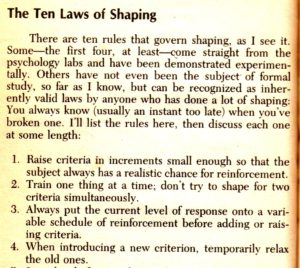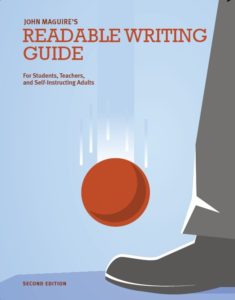Some teachers worry that emphasizing concrete nouns will reduce your ability to say interesting things about ideas. Geraldine A., who teaches freshman comp in Boston, expressed that worry recently. She wrote:
“I appreciate the section encouraging use of concrete nouns, but I would want to be careful not to jeopardize precious abstracts.”
Geraldine, using concrete nouns does not jeopardize “precious abstracts”—it adds to their impact on the reader. Concrete nouns actually increase your ability to express ideas.
What really diminishes the power of “precious abstract” words is overuse. Writing that chains together abstractions, no matter how precious they are to you, ends up baffling the reader. For an example, here’s something from a college document:
The institution’s academic programs are consistent with and serve to fulfill its mission and purposes. The institution works systematically and effectively to plan, provide, oversee, evaluate, improve, and assure the academic quality and integrity of its academic programs and the credits and degrees awarded.
Can you tell what that means? Easily?
Here’s the same passage with the abstract nouns bolded (remember these are nouns you can’t drop on your foot). They don’t look so precious this way.
The institution’s academic programs are consistent with and serve to fulfill its mission and purposes. The institution works systematically and effectively to plan, provide, oversee, evaluate, improve, and assure the academic quality and integrity of its academic programs and the credits and degrees awarded.
To me they look like dead weight.
Remember that all abstract ideas are drawn from the physical world of things and people. (ab straho in Latin means draw from.) In other words, abstract ideas having been drawn from the physical world can be related back to it. (S.I. Hawakawa, a linguist and philosopher, uses the metaphor of a ladder of abstraction to explain this. All writers should understand the ladder of abstraction.)
Rudolf Flesch sees the problem with abstraction as the problem of being clear to the reader. You can never tell what image a reader will get in his or her head when an abstract idea is mentioned. It’s the image in the reader’s head you are concerned about. He counsels returning to the physical world as often as you can when writing about ideas so you can give the reader good guidance.
You cannot prevent a reader from reading meanings into your words that you didn’t think of; but you can guide his interpretation of the more abstract words—which are the most dangerous—by using as many concrete cases, illustrations and examples as possible. As a rule, you should never stay at the abstract level for long; as soon as you get there, turn around and plunge again into the down-to-earth world of people and things. This “up-and-down” writing is the only protection against misunderstanding. It’s no guarantee; but it’s the best method there is. (Flesch, Art of Readable Writing, 1974, p 195.)
Abstraction is not the enemy. Abstract ideas are beautiful, needed and precious. But the skilled writer will always root them wherever possible in people and things. That takes practice. You have to think about it and work on it. That’s why we begin this readability course with a two-week focus on “concrete nouns”–so we can get our ideas across.


